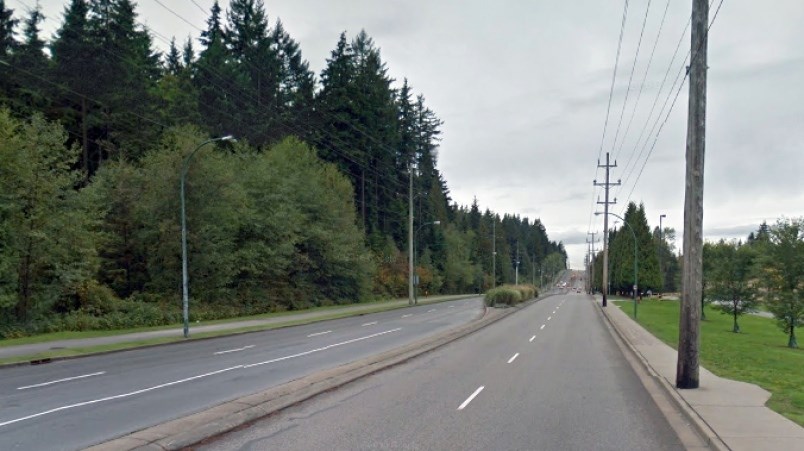A dispute between the city of Coquitlam and FortisBC over the replacement of a natural gas pipeline running under Como Lake Avenue is heading to the BC Utilities Commission.
The municipality is asking the utility provider to remove the 5.5-km section of the line it will decommission as part of an upgrade next year that will severely reduce traffic flow on the busy arterial route for months.
But FortisBC has told engineering staff it intends to fill the old 20-inch pipe with concrete and leave it in place, which the company says is standard practice.
That’s not good enough, according to city manager Peter Steblin, who told a council-in-committee meeting Monday that staff are concerned about the increased congestion of utilities and infrastructure under city roads.
“In our opinion, [FortisBC does] not show enough credence to other users,” he said. “They are very focused on their needs and they are not as concerned as we believe they should be… with other utilities and other stakeholders present and in the future.”
He later added: “We have been trying to negotiate with the company what we consider are reasonable requirements in terms of how they should deal with that pipeline and we have not been successful.”
The city, which is to receive a $300,000 community amenity contribution from the utility company, also wants FortisBC to repave Como Lake Avenue from curb to curb, a requirement the company has indicated it will not meet.
Discussions between FortisBC and the city over the project have been ongoing for more than four years. And because of the impasse, FortisBC recently took the issue to the BC Utilities Commission, where it is seeking approval to move ahead with construction without a permit from Coquitlam.
The company wants to upgrade its service with a 30-inch line that will replace the existing 20-inch pipe that has been in the ground for more than 50 years and is nearing the end of its lifespan. The work is part of a larger project, the Lower Mainland Intermediate Pressure System Upgrade, which has already started along 1st Avenue in Vancouver and will continue into Burnaby later this year. The work in Coquitlam is not expected to get underway until 2019.
FortisBC told The Tri-City News the replacement of the line is necessary in order to ensure the safe delivery of natural gas to 200,000 local residents, 31,000 in Coquitlam.
Doug Stout, the company’s vice-president of market development and external relations, said removing the old line would increase the length of time it will take for construction and add additional cost to the project.
He noted that lines installed in the 1950s have a coating that “has been known to contain low levels of asbestos” and removal would have to be done in accordance with workplace safety regulations. He said the most recent estimate for the pipe’s removal is between $70 million and $100 million.
“Leaving it in place reduces the impact to communities,” he said. “Removing it requires us to dig up twice as much road, adding months of inconvenience to the community. Doing so would also have significant costs.”
He said while the line is underground, FortisBC is still responsible for it and will remove section if it interferes with municipal infrastructure.
As for repaving Como Lake Avenue, Stout said it is customary for utility providers to replace the pavement disturbed during construction rather than the entire street. “The cost of additional repaving would need to be borne by FortisBC customers, which we do not feel is prudent,” he said.
Stout noted the project has received permits and approvals from the city of Vancouver and Burnaby without being required to remove the existing pipeline.
But Jozsef Dioszeghy, Coquitlam’s general manager of engineering and public works, said the Como Lake corridor has unique issues not seen in Vancouver and Burnaby. For one, the thoroughfare is much narrower than 1st Avenue, which has a large boulevard separating the east- and westbound lanes, creating more room for utilities underground.
Work in Coquitlam will also see greater traffic impacts, he said. Vancouver and Burnaby have multiple route alternatives while Como Lake Avenue, which is expected to be reduced to between one and two lanes for the duration of the eight-month project, is one of only a couple of east-west corridors in the southwest neighbourhoods of the municipality.
“They have more alternatives than we do,” Dioszeghy told The Tri-City News following Monday’s council meeting. “[Traffic] is going to spread all over the city and it is going to be chaotic… The problems the city of Vancouver is having will be magnified in Coquitlam.”
Mayor Richard Stewart said the city recognizes the need for the project and supports the infrastructure improvements but said the company needs to take the existing line out of the ground when it installs the new one. “To suggest the taxpayers of Coquitlam ought to subsidize their operations, I find offensive,” he said during Monday’s meeting.
“Take your garbage with you when you leave,” he added later.
The B.C. Utilities Commission will deal with the matter later this summer and is expected to receive feedback and written submissions from the public.



